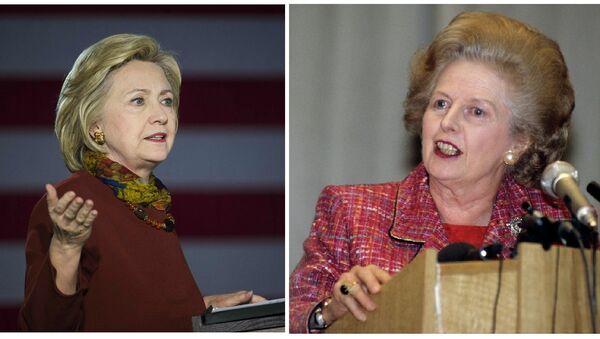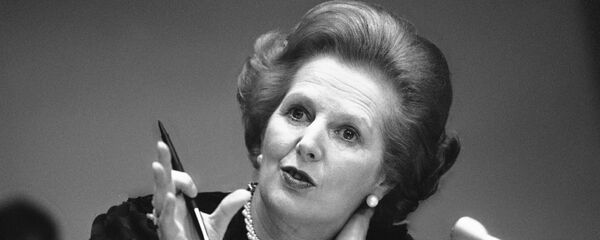She has — by most analysis — shown herself to be an economically conservative and militarily hawkish candidate for US President. But are the comparisons to the former UK Prime Minister Margaret Thatcher accurate or justified?
Meanwhile, Hillary Clinton appears to be a mirror image of Margaret Thatcher.
— Rachel Haywire (@RachelHaywire) May 8, 2016
Review Marg Thatcher's like/dislike ratings as PM makes U wonder if Hillary Clinton could be America's Thatcher, but from the Labour side.
— JQ Public (@JQP6) May 7, 2016
Hillary's position on a raft of classic conservative policies has certainly placed her on the right wing of the Democratic Party, and that would be the case even without juxtaposing her campaign against that of Bernie Sanders.
On allocation of military funding and interventionist foreign policy for example, Hillary Clinton has proved uncompromising on a number of occasions; even Donald Trump has called her "trigger happy."
Margaret Thatcher and Hillary Clinton should never even be mentioned in the same sentence. Hillary is no Thatcher. https://t.co/z9RoIDNSu5
— Rhonda (@wvufanagent99) May 7, 2016
Interventionist foreign policy is not something for which the late Margaret Thatcher was famed; in fact her bitterly contested legacy was largely concerned with domestic affairs, and rolling back the state. That said, Thatcher's response to Argentina's invasion of the Falkland Islands in 1982, is widely regarded as saving her from electoral defeat. The Falklands War saw a huge increase in Thatcher's popularity coupled with a surge in British militaristic patriotism, epitomized by the famous images of her in a tank.
Hillary Clinton has been criticized by her left-wing opponents for her involvement with the Republican Party as a student, though in reality this is not as damning an indictment as it might seem.
Clinton came from a wealthy background, and a very conservative family — quite unlike Margaret Thatcher of course, who grew up in a small apartment above her father's grocery shop.
Margaret Thatcher is a divisive figure, and her ideological position has seen her both revered and maligned in equal measure.
In reality of course, Thatcher was a figurehead for conservative economic ideology in the 1980s, popular not just in the UK but also in the US under Ronald Reagan.
There was a powerful movement behind what became known as Thatcherism, and many commentators have since suggested that the symbolism of a powerful woman has much more to do with her legacy than policy itself.
Hillary Clinton has so such in common with Margaret Thatcher. Most of her ideals are in line with today's Conservative Party.
— ⚒ Steven ⚒ (@BritishBerner) May 8, 2016
The journalist and historian Tim Stanley told Sputnik that he didn't believe comparisons between Thatcher and Clinton were warranted.
"I think there's a temptation to make a comparison, simply because they are both women in politics, and they both represent a theoretical first — Margaret Thatcher for being the first female Prime Minister, Clinton being the first female President. But I think that there the similarities end in terms of philosophy, and also in terms of temperament," Stanley told Sputnik.
He added:
"Both of them have had to be strong political figures in a male dominated world. Contemporary American politics is even more masculine than European politics; it's very hard to get elected to anything as a woman. So, in that sense they will have faced the same sorts of pressures and challenges, but I do think that their philosophy and their temperament are probably very different."
Whilst there are of course similarities between the two, Hillary's conservatism is not just different to that of Thatcher's, it is of a different time entirely.



